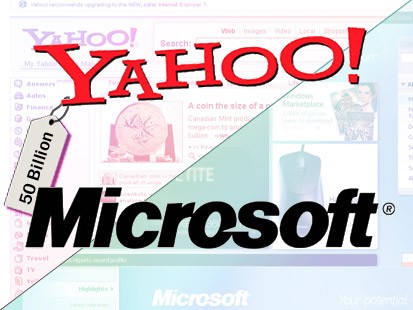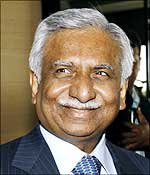
Microsoft is likely to pursue a hostile bid for Yahoo Inc takeover, people familiar with the proceedings said.
However, the situation remains fluid as discussions continue. The software giant is likely to change tracks before announcing its decision on Friday. Microsoft said nothing about its plans.
In an interview to Wall Street Journal, Steve Ballmer, Microsoft CEO, declined to comment on his company's decision or the probable day when this decision would be made public. He said Microsoft will announce its decision when the circumstances are right.
Price will be a key factor if Microsoft turns hostile towards Yahoo. Microsoft's unsolicited cash-and-stock offer was valued at $29.48 a share as of 4 p.m. on Thursday, on Nasdaq stock market composite trading. Yahoo had rejected this offer on the grounds of undervaluation.
The software major had decided to up its bid as much as $33 per Yahoo share as major Yahoo shareholders have signalled that they want a price in the range of $35 to $37 a share, informed sources said.
In case it decides to turn hostile, Microsoft will put forth an offer which it deems will be acceptable to Yahoo shareholders, though investors might ratchet down their demands in the face of a take-it-or-leave-it Microsoft offer.
As reported in WSJ, while addressing his staff at its Redmond headquarters in Washington on Thursday, Ballmer confirmed that he was not willing to pay a dime above what he thought Yahoo was worth. He added that Microsoft will announce its decision in a relatively short order. His comments were provided by a company spokesperson.
A Yahoo spokesman declined to comment on Ballmer's remarks.
A hostile bid would raise the risk of many Yahoo employees leaving in the process. Yahoo's poison-pill anti-takeover defenses essentially require any would-be hostile acquirer to remove its board. A vote on the directors occurs annually at Yahoo's shareholder meeting. Although the annual meet is not yet announced, it likely to be held in July.
In his interview to WSJ, Ballmer said that he is confident Microsoft will be able to build a competitive online-advertising business without buying Yahoo, though such a move may be more time consuming. He voiced optimism in Microsoft's options if it decides not to pursue its Yahoo bid.
Whilst outlining his company's rationale behind buying Yahoo, Ballmer said he believed Yahoo has the technology but not the scale, like number of customers and advertisers that it needs.
Shrugging off the perception that Microsoft has failed in its attempts to build its own online services and ad business, Ballmer said he appreciates his company's strategy but doesn't like its position. He would prefer a better position compared to the company selling maximum ads, referring to Google Inc, WSJ reported.
Responding to a question on alternative acquisitions to Yahoo, Ballmer said there are very few Internet companies that have the kind of size Microsoft needs to expand its business rapidly.
As reported in WSJ, while talking about the scale of an Internet company, Ballmer listed five to six companies that have a reputation to vouch for -- News Corp's Myspace, Facebook Inc, Yahoo, Google, Time Warner Inc's AOL and Microsoft's MSN service.
Meanwhile, Yahoo continues its efforts at negotiation with Google and Time Warner's AOL Internet unit, even as it awaits Microsoft's decision, informed sources said.


